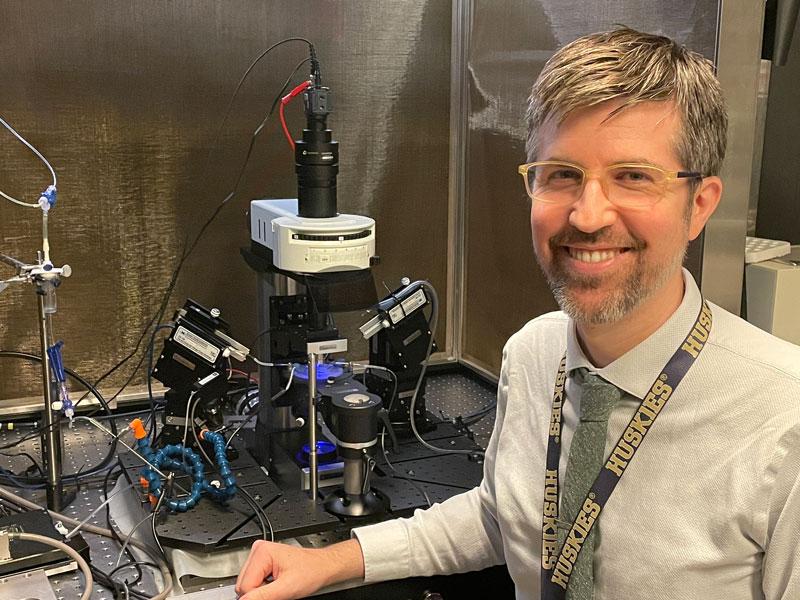
Fortenbach Lab investigating the therapeutic potential for photoswitches to restore vision
Age-related macular degeneration and retinitis pigmentosa are degenerative diseases affecting millions of people worldwide. They cause progressive loss of the outer retina, characterized by the death of rod and cone photoreceptors. This leads to declining vision and, in some cases, blindness. While treatments to prevent degeneration remain under investigation, therapies to restore vision have begun to emerge, including synthetic small molecules known as photoswitches.
Assistant Professor Chris Fortenbach, MD, PhD, is investigating the therapeutic potential for photoswitches to restore vision in degenerated retinas in his lab at the Vision Science Center in South Lake Union. These light-sensitive small molecules bind to the degenerating retina and confer new light sensitivity to retinal cells. Several generations of these molecules have been developed with differing cell target specificity and sensitivity.
In contrast to other therapies requiring surgery, photoswitches can be delivered via intravitreal injection, a procedure performed over 20 million times per year globally. Most recently, promising phase 1 clinical trial data have demonstrated vision restoration in several human subjects.
The Fortenbach Lab is researching the mechanisms by which photoswitches restore light sensitivity and methods to improve visual outcomes among treated individuals. The lab uses a combination of electrophysiology methods, including whole-cell and multielectrode array recordings, in conjunction with machine learning to assess the ability of photoswitches to encode visual information. Overall, the lab's goal is to help develop a medication capable of restoring sight and improving the quality of life for patients with vision loss.
Dr. Fortenbach joined the faculty in August 2023 after completing his ophthalmology residency and vitreoretinal surgery fellowship at the University of Iowa Hospitals and Clinics. His clinical practice is at the Karalis Johnson Retina Center and the Veterans Affairs Puget Sound Healthcare System.
Dr. Fortenbach grew up in Northern California, where he attended the University of California, Davis for his undergraduate education. He stayed on for the MD/PhD program, where he earned his PhD in Biochemistry, Molecular, Cellular, and Developmental Biology, studying how retinal neurons convey the presence of light.
He first became involved in research in high school and joined a plant pathology lab at UC Davis during his undergrad years studying food science. He became interested in medicine while working in a clinic serving the underserved. Joining the MD/PhD program, he gained his first experience in vision science.
“Vision science is unique in that we can trace it from basic scientific principles to human perception,” Dr. Fortenbach said. “This understanding means that when things go awry, we have a solid foundation in science from which to build new treatments of ophthalmic disease.”
Dr. Fortenbach and his wife, Jennie, a pediatric physical therapist, are the parents of a two-year-old girl and are expecting their second child. In his spare time, Dr. Fortenbach enjoys backpacking, cycling, tennis, and cooking.
